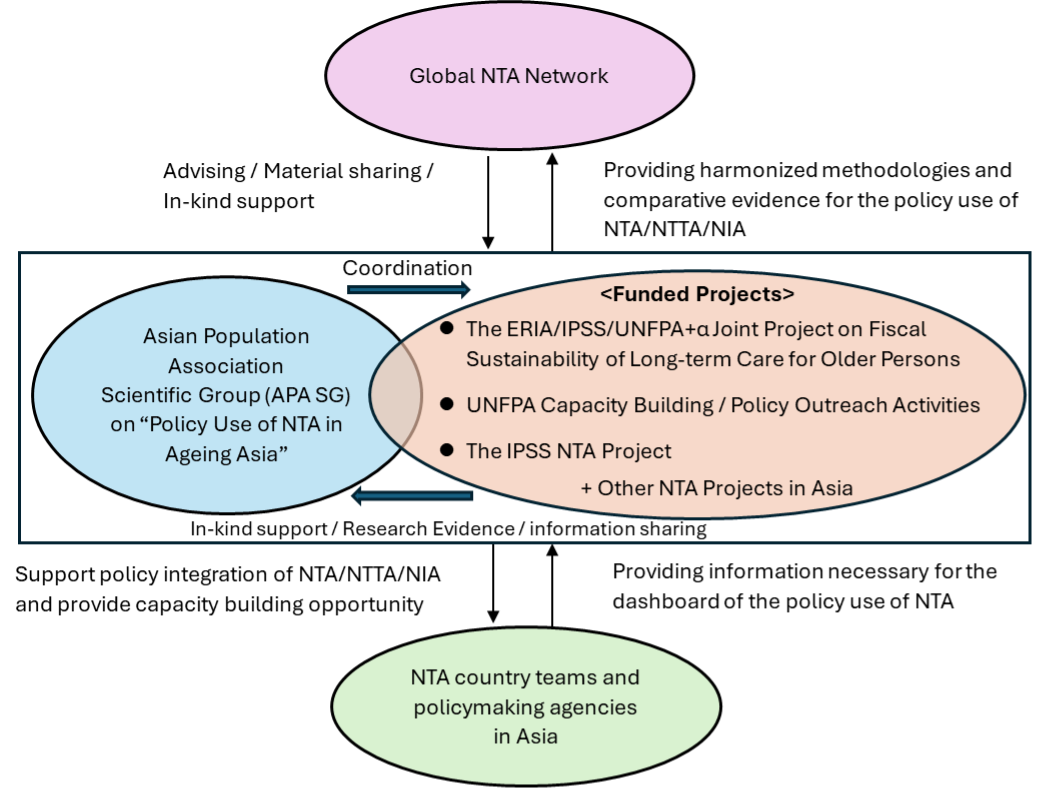- Home
- About APA
- Council
- Scientific Group
- Newsletter
- Publication
- Membership
- Conference
- Resource
- News
- APA Activities and Announcements
- Asian Population & Demography in the News
- Other News & Announcements
- Graduate Opportunities & Job Vacancies
- Forthcoming Meetings, Workshops, Seminars and Conferences around the Region
- Call for Abstracts/Papers/Proposals
- APA Announcement on the Global Data Deprivation
- Sitemap


- Home
- Scientific Groups
- Policy Use of National Transfer Accounts (NTA) in Ageing Asia
Policy Use of National Transfer Accounts (NTA) in Ageing Asia
Objectives
- Promote the policy integration of NTA in rapidly ageing Asian countries by aligning outputs with key national policy priorities and strengthening institutional capacity.
- Build and strengthen a regional network of NTA practitioners to foster collaboration, facilitate knowledge sharing, and promote regional learning.
The demographic future of Asia demands urgent and informed action. The NTA framework provides essential data and analytical tools to support the development of sustainable, fair, and effective policies. By advancing the policy application of NTA and building a strong regional network, this Scientific Group on NTA (APASG-NTA) aims to help Asian countries respond to the challenges of ageing with resilience and fairness.
Key Activities
- Policy Engagement Workshops: Convene NTA teams, policymakers, and international experts to translate data into actionable insights and foster policy dialogue.
- Capacity Building: Deliver targeted training for government officials and researchers on the production, interpretation, and application of NTA data.
- Policy Briefs and Guidelines: Develop clear, accessible materials to communicate findings and promote integration into national planning and policy frameworks.
- Regional Knowledge Exchange Platform: Establish a digital platform featuring a dashboard on policy use of NTA/NTTA/NIA, including summary indicators, methodologies, visualizations, policy briefs, best practices, failure cases, and joint research outputs.
- Comparative Studies: Support cross-country research projects to identify regional trends, shared challenges, and effective policy responses across Asia.
Through these activities, the APASG-NTA seeks to institutionalize the NTA framework by working with national agencies to embed NTA into official statistical systems and long-term policy planning processes.
Expected Outcomes
- Increased policy uptake of NTA in national strategies related to ageing, pensions, and care systems.
- Improved capacity among policymakers and researchers to collaborate effectively and apply NTA data in policy development.
- Strengthened regional collaboration through the establishment of a sustained community of practice.
- Greater visibility and credibility of NTA in both policy and academic spheres, driven by increased awareness of their relevance to policy reforms.
- Harmonized methodologies and regional benchmarks to support consistent analysis and strategic planning across countries.
Funding
The main funding source for the group's activities will be the jointly provided by the Economic Research Institute for ASEAN and East Asia (ERIA), the Japan National Institute of Population and Social Security Research (IPSS), and the United Nations Population Fund (UNFPA). Additionally, capacity building, policy outreach initiatives, and research projects conducted by ERIA, IPSS and UNFPA will also contribute to some of these activities. The APASG-NTA is also open to contribution in cash or in-kind from other individuals and institutions.
The Asian Population Association Scientific Group (APA-SG)
on the “Policy Use of NTA in Ageing Asia”

|
Aims:
Expected outcomes:
|
- The project will be implemented through a close partnership with national NTA teams in Asia, Global NTA Network researchers, and stakeholders from the funding projects.
External Links
- The Global NTA Network
https://ntaccounts.org/web/nta/show
- The Counting Women's Work Project
https://www.countingwomenswork.org/
- NTA Asia Site
https://asia.ntaccounts.org/web/nta/show/
APA Secretariat Office
Institute for Population and Social Research,
Mahidol University, Salaya Campus, Phutthamonthon,
Nakhon Pathom, 73170 Thailand  This email address is being protected from spambots. You need JavaScript enabled to view it.
This email address is being protected from spambots. You need JavaScript enabled to view it.
Copyright © 2021 Asian Population Association
Visitor Info
Starting on April 1, 2021
